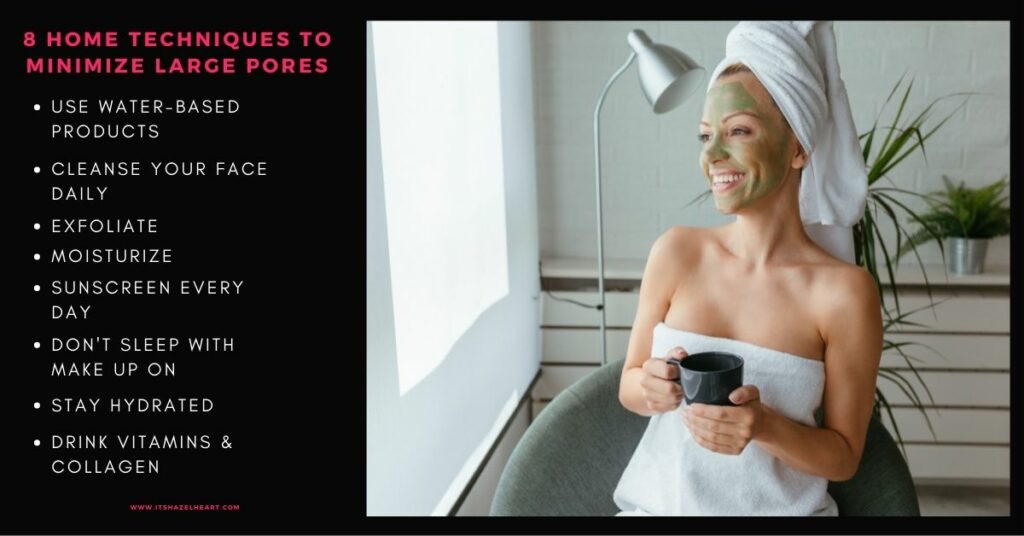8 Best Home Techniques To Minimize Large Pores
Let’s get something straight: You cannot get rid of your pores. Love them or hate them. Why? Because pores are small openings in the skin that release oils and sweat. Pores allow the skin to breathe and are the passageway between the inside and outside of the body. However, there are eight home techniques to minimize large pores that you can try.

There are two types of pores. One releases the body’s natural oil, called sebum, and the other releases sweat. But sometimes, the oil-releasing pores appear enlarged because of the following reasons:
- acne
- increased sebum production; which causes oily skin
- sun damage
Although you can’t change the size of your pores, there are available home techniques you can try.
In this article, we will promote skin health by knowing the techniques to minimize large pores.
Table of Contents
8 Home Techniques To Minimize Large Pores
USE WATER-BASED PRODUCTS
If you have oily skin, ensure you use water-based products. These products avoid extra oil getting into the pores. Avoid oil-based products because they lead to excess oil on the skin, making pores appear more prominent.
CLEANSE YOUR FACE DAILY
Daily cleansing is the best way to keep pores clean. Cleanse twice a day but if you cleanse once a day, choose the nighttime. Your skin will have a buildup of dirt, makeup and you have to clean it all out before going to sleep.
Use creamy cleansers for normal to dry skin, while for those with large pores related to oily skin, look for a gel-based cleaner. Gel-based cleansers help to clear oil from the pores, reducing their appearance.
Avoid using cleansers that contain soap or scrubbing agents. These can make pores look more prominent.
However, remember that even the best cleansers will only do good if used properly. Be sure to:
- Wet your face with warm water (not hot, not cold).
- Massage the cleanser in circles around your entire face and neck for at least 30 to 60 seconds.
- Rinse thoroughly and pat your skin dry. (Do not rub)
Repeat this process every morning and night to balance your skin and keep your pores in good health.
EXFOLIATE
You should exfoliate once or twice a week if you have oily skin. Exfoliating helps to remove dirt, dead skin cells, and excess oil from the pores that can block them.
Look for an exfoliating product that contains salicylic acid, a natural acid that helps to release debris from the pores.
It is essential to exfoliate, but exfoliating too frequently with salicylic acid or alcohol can dry out the skin. Exfoliate once or twice a week only. Exfoliation keeps the pores unclogged but can look bigger if the skin becomes too dry.
MOISTURIZE
Moisturize for balanced hydration. One of the common mistakes of people with oily skin is that they skip putting on moisturizer because they think it will add to the oil on their face. Moisturizing products help natural sebum penetrate the deeper layers of your skin. Moisturizers not only reduce the appearance of the oiliness but also helps the condition of your skin effectively. Without a moisturizer, the skin could produce more oil.
If you have large pores, choose a light, water-based moisturizer.
SUNSCREEN EVERY DAY
Sunscreen is a must-have for everyone. Sun damage not only dry out your skin but also makes your pores look bigger.
Use a product with an SPF of at least 30. Apply it at least 15 minutes before you go out. You can also choose moisturizers and foundations that contain SPF in them. Avoid being out in the sun from 10 in the morning to 4 p.m.
DON’T SLEEP WITH MAKEUP ON
Sleeping with makeup on is detrimental to your skin. When makeup is left overnight, it can combine with dirt, oil, and bacteria and clog up your pores.
No matter how tired or late you get home, it is essential to wash your face.
STAY HYDRATED
Drinking at least eight glasses of water a day benefits your pores and overall skin health. Water helps by:
- hydrating your skin internally
- removing toxins from your pores
- improving your overall complexion
If you don’t like drinking plain water, you may try to add flavors like lemon, cucumber, or berries if you want.
DRINK VITAMINS AND COLLAGEN
Vitamin D
Vitamin D is most made when our skin absorbs sunlight. Cholesterol converts to Vitamin D when it happens. Vitamin D is then taken up by the liver and kidneys and transported throughout the body to help create healthy cells. This includes the skin, where Vitamin D plays a vital role in skin tone. It may even help treat psoriasis also.
Increase vitamin D intake by:
- getting 10 minutes of sun exposure a day
- eating fortified foods such as cereals, yogurt, and orange juice
- eating foods containing vitamin D such as salmon and tuna
Vitamin C
Vitamin C is found at high levels in the epidermis (outer layer of the skin) and the dermis (inner layer of the skin). Aside from having cancer-fighting properties, Vitamin C has a significant role in collagen production to help keep the skin healthy.
Taking Vitamin C can enhance the effectiveness of sunscreens applied to your skin for sun protection. It helps by decreasing cell damage and helps in the healing process of the wounds. It also helps to reduce the appearance of wrinkles and repair and prevent dry skin.
Get enough Vitamin C by:
- eat more citrus foods such as oranges
- eat plant-based sources like strawberries, broccoli, and spinach
- drink orange juice
- take Vitamin C supplements as recommended by your doctor
Vitamin E
Like Vitamin C, Vitamin E is an antioxidant. Its primary function is to protect against sun damage. Vitamin E is produced through sebum, an oily substance emitted through the skin pores, as mentioned in the 1st paragraph. If you have dry skin, vitamin E can help counteract a lack of sebum, and it also helps to treat skin inflammation.
Adults need 15mg of Vitamin E daily, and you may increase your intake by:
- eating more nuts like almonds, hazelnuts, and sunflower seeds
- taking a multivitamin or Vitamin E supplement
Drinking Collagen
People are now turning to collagen for acne scars, wrinkles, dry, sagging skin, and even eczema. Collagen plays a vital role in the health and appearance of our skin.
Collagen is the most abundant protein in our body. It affects our skin at the deepest level; therefore, it gives our skin its structure and stability. Without collagen, our skin would fall apart.
A collagen is a powerful tool for skin health. If your skin is essential to you, add collagen drinks to your diet. It can improve skin elasticity, combat wrinkles, and help solve acne problems.
The eight home techniques mentioned above are good ways to reduce the appearance of pores. But we should promote the health of our skin by:
- Eating well. Get the right balance of nutrients, fats, proteins, and carbohydrates. This can improve our overall health. When we have a healthy diet, it reflects in our skin.
- Drink plenty of water. Water hydrates a person’s skin from within. It helps to improve overall complexion.
- Exercise regularly. Regular exercise increases blood flow to all parts of our body, including our skin. Our sweat contains a natural antibiotic that helps protect our skin from bacteria.





